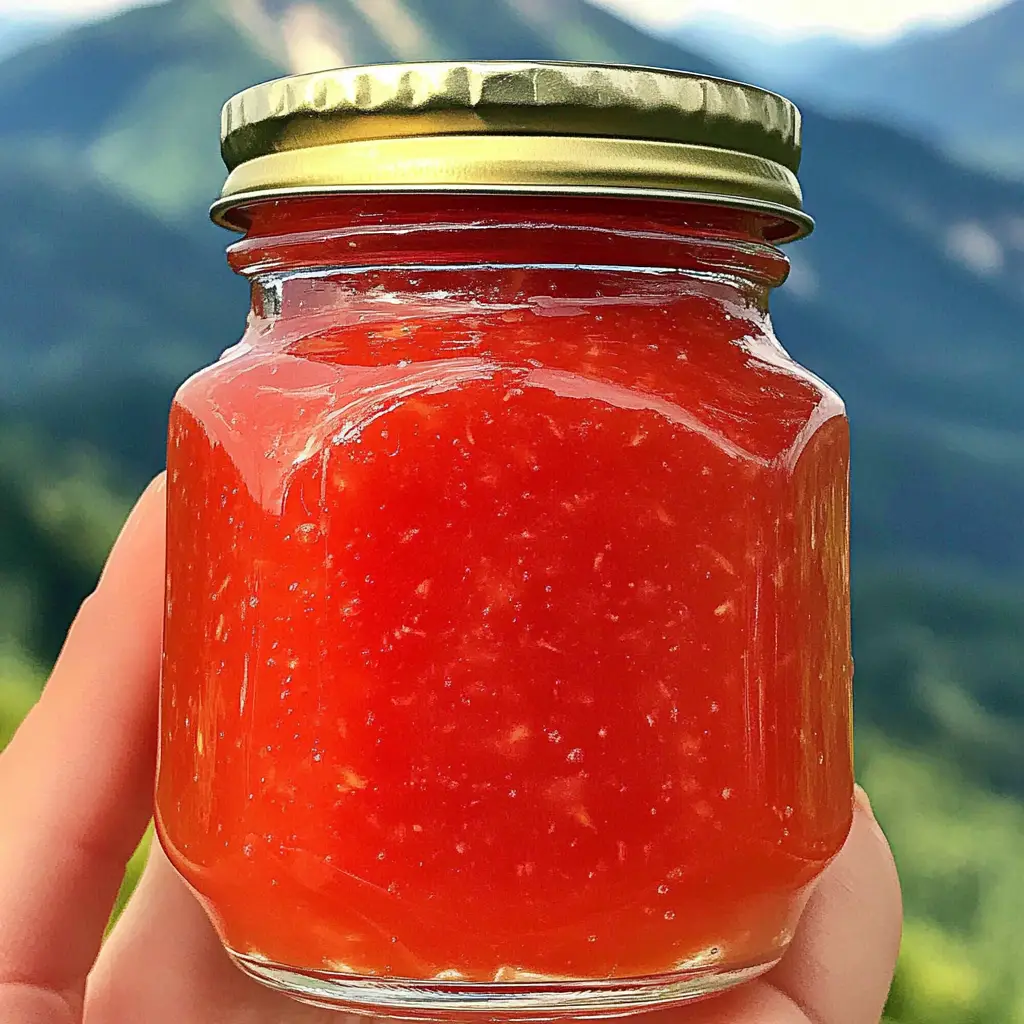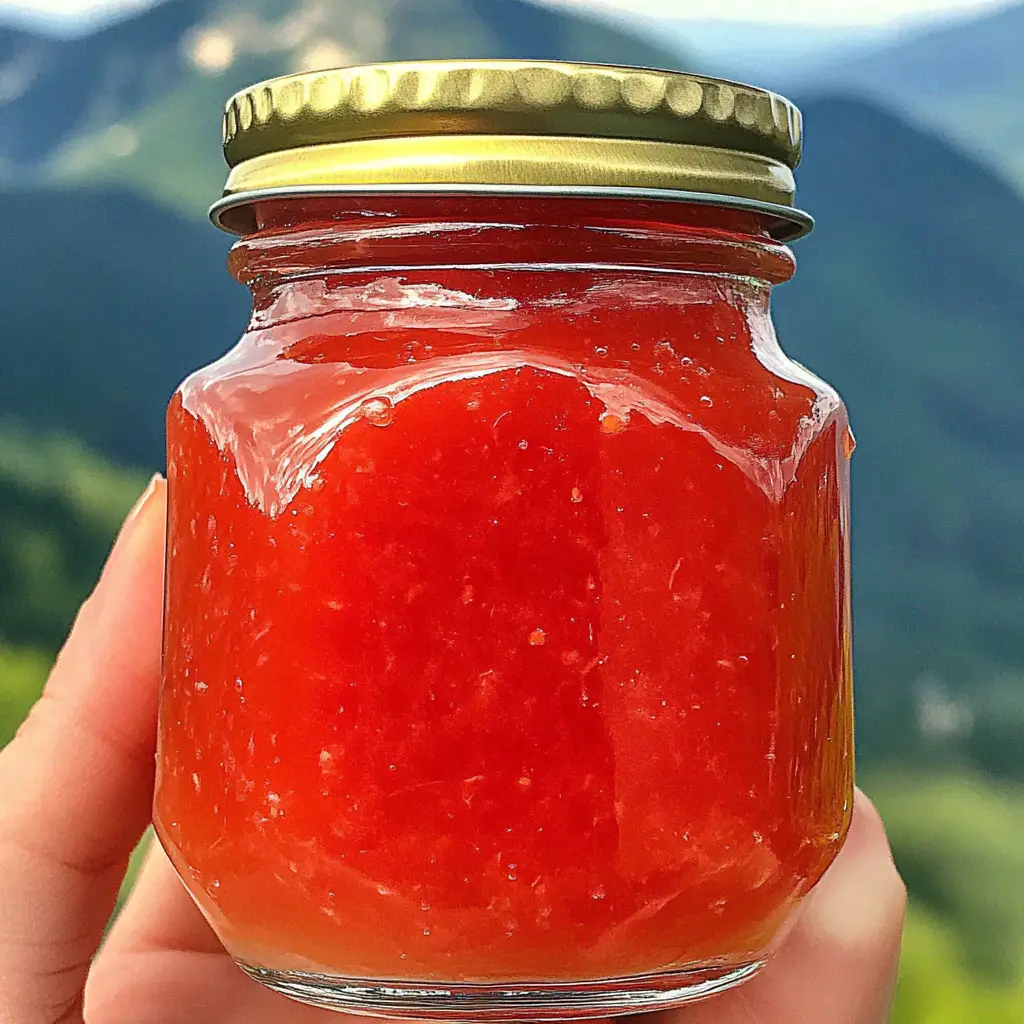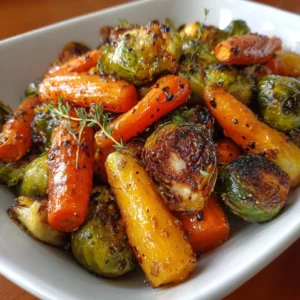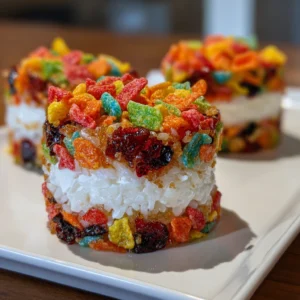Watermelon is a quintessential summer fruit — juicy, refreshing, and sweet. But have you ever thought about transforming this summertime favorite into a thick, luscious honey-like syrup? Introducing Watermelon Honey — a homemade, naturally sweet spread that captures the pure essence of watermelon in a versatile form. This delightful creation is vegan, simple to make, and utterly delicious.
In this article, I’ll walk you through everything you need to know about making watermelon honey, why you’ll want it in your pantry, how to use it creatively, and much more. Get ready to discover a new way to enjoy watermelon all year round!
Why Is This Recipe So Popular?
Watermelon honey has gained popularity for many compelling reasons that resonate with home cooks, health enthusiasts, and foodies alike. Here’s a breakdown of why this simple yet ingenious recipe has captured so much attention and love:
1. Simplicity Meets Flavor
At its core, the recipe uses only one main ingredient — watermelon — yet transforms it into something entirely new and exciting. This simplicity appeals to people who want natural, clean-label foods without complicated ingredient lists or hard-to-find additives. The natural sweetness and refreshing flavor of watermelon concentrate into a rich honey-like syrup, offering a unique taste experience that’s both familiar and novel.
2. Health-Conscious Alternative
In an era where many are seeking healthier lifestyles, watermelon honey stands out as a natural, vegan, and gluten-free sweetener alternative. Unlike commercial syrups or processed honey, it contains no added sugars, preservatives, or artificial ingredients. For those managing sugar intake or following plant-based diets, it’s an excellent option that satisfies sweet cravings with wholesome fruit.
3. Versatility in the Kitchen
Its broad range of uses — from drizzling on breakfast foods, enhancing cocktails, sweetening desserts, or even adding flair to savory dishes — makes watermelon honey incredibly versatile. People love having a multi-purpose ingredient that can enhance various recipes and meals, reducing the need for multiple condiments or sweeteners.
4. Seasonal and Sustainable
Watermelon honey is especially popular during summer months when watermelons are abundant, fresh, and affordable. It’s a smart way to preserve and enjoy seasonal fruit beyond its natural shelf life. Moreover, making watermelon honey encourages reducing food waste by utilizing excess watermelon that might otherwise go unused.
5. DIY Appeal and Homemade Satisfaction
There’s something deeply satisfying about making your own food from scratch, and watermelon honey taps into that DIY spirit. Home cooks appreciate the process of turning simple ingredients into something delicious and storeable, giving them control over what goes into their food. Sharing homemade watermelon honey as gifts or treats also adds to its charm.
6. Eye-Catching Appearance and Aroma
The bright pinkish-red hue and sweet, fresh aroma of watermelon honey make it appealing not only to the palate but also visually and aromatically. It adds color and freshness to dishes, making meals more enticing and enjoyable.
7. Social Media and Food Trends
Like many natural and homemade recipes, watermelon honey has enjoyed a surge in popularity through social media platforms such as Instagram, TikTok, and Pinterest. Its vibrant color, easy preparation, and aesthetic appeal make it a favorite subject for food bloggers and influencers, fueling curiosity and inspiring others to try it.
In summary, watermelon honey’s popularity comes from its beautiful simplicity, health benefits, versatility, and the joy of homemade goodness. It’s a recipe that fits perfectly into modern lifestyles focused on natural ingredients, culinary creativity, and sustainable eating.
Why You’ll Love This Watermelon Honey Recipe
Watermelon honey is not just another fruit syrup. Unlike commercial syrups laden with refined sugars and preservatives, this recipe is as natural as it gets. Using only one ingredient — a fresh, ripe watermelon — you produce a thick, sweet spread packed with natural sugars and vibrant fruit flavor.
1. Pure, Simple, and Healthy
Because you’re using pure watermelon and no added sugars, this syrup is a healthier alternative to honey or artificial syrups. It’s vegan, gluten-free, and contains antioxidants and vitamins, especially vitamin C, naturally found in watermelon. The simmering process concentrates the sugars in the fruit, creating a rich sweetness without any artificial additives.
2. Versatile Usage
Watermelon honey’s uses go way beyond drizzling over pancakes. It’s a fantastic natural sweetener for:
-
Breakfast foods like yogurt, oatmeal, or waffles
-
Smoothies and cocktails for a fruity twist
-
Dessert toppings for ice cream, cakes, and pies
-
Salad dressings or glazes for grilled fruits and meats
-
A spread on toast, crackers, or even paired with cheeses
3. Homemade and Cost-Effective
Instead of buying expensive specialty syrups or honey alternatives, making watermelon honey at home is budget-friendly, especially when watermelons are in season. Plus, it’s a great way to use up excess watermelon and reduce food waste by transforming it into a shelf-stable product.
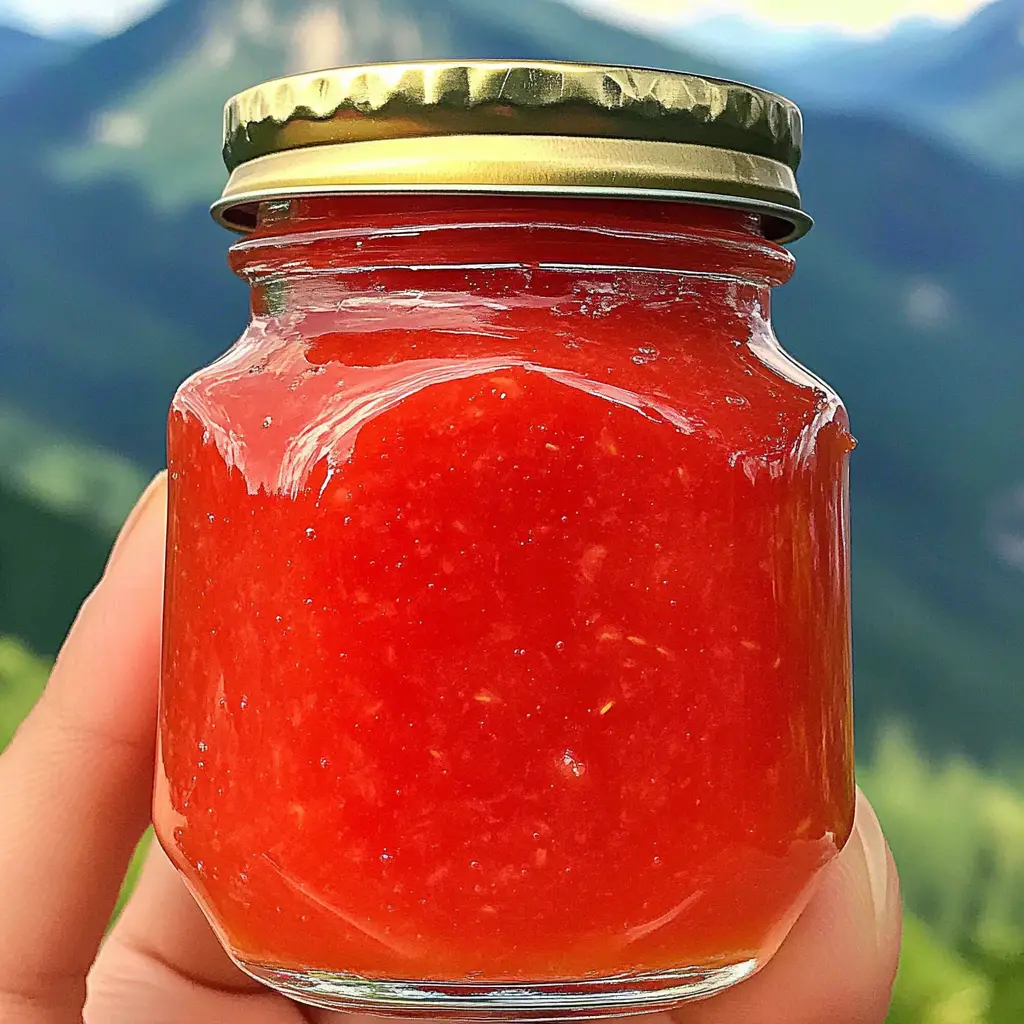
Ingredients
The beauty of this recipe lies in its simplicity:
-
1 large watermelon
That’s literally all you need! No sugar, no preservatives, no complicated additives — just pure watermelon, transformed by your own hands into a luscious honey-like syrup.
Step-by-Step Preparation Instructions
1. Selecting the Perfect Watermelon
Choosing the right watermelon is crucial. Look for one that feels heavy for its size, with a deep, hollow sound when tapped. The rind should be dull, not shiny, indicating ripeness. The more ripe and sweet the watermelon, the better your honey will taste. If possible, buy a locally grown watermelon during peak season for maximum flavor.
2. Cut and Prepare the Watermelon
Start by washing the exterior of the watermelon thoroughly. Then, carefully cut it into chunks, removing the rind and all the seeds. Seedless watermelons make this step easier, but if you’re working with seeded varieties, be meticulous to remove every seed for a smooth puree.
3. Puree the Watermelon
Transfer the watermelon chunks to a blender or food processor. Blend until you get a smooth, juicy puree. Depending on the size of your blender, you might need to work in batches. The goal is to extract as much juice as possible.
4. Simmer the Puree
Pour the watermelon puree into a large, heavy-bottomed pot. Place it on medium-high heat and bring it to a boil. Once boiling, reduce the heat to low and let it simmer gently. This slow cooking process evaporates excess water and thickens the puree into a syrupy texture.
Important: Stir frequently, especially as the mixture thickens, to prevent sticking or burning. Depending on your stove and pot, this simmering can take anywhere from 1 to 2 hours.
5. Check for Desired Thickness
The watermelon honey is done when it has reduced enough to coat the back of a spoon thickly, similar to the consistency of honey or maple syrup. Remember, it will thicken a little more as it cools.
6. Cool and Store
Remove the pot from heat and allow the watermelon honey to cool completely at room temperature. Once cooled, transfer the syrup into sterilized glass jars or airtight containers. Refrigerate immediately. Stored properly, your watermelon honey can last for up to 3 weeks in the fridge.
How to Sterilize Jars for Storage
To ensure your watermelon honey stays fresh and safe, sterilizing jars is essential:
-
Wash jars and lids thoroughly in hot, soapy water.
-
Place jars in a large pot of boiling water for 10 minutes.
-
Remove carefully with tongs and let dry on a clean towel.
-
Pour cooled watermelon honey into jars and seal tightly.
Sterilized jars reduce the risk of spoilage and extend shelf life.
Serving Suggestions
Watermelon honey’s naturally sweet and fruity profile lends itself to a variety of delicious uses. Here are some ideas to get your culinary creativity flowing:
1. Drizzle over Breakfast Favorites
Whether it’s pancakes, waffles, French toast, or crepes, a generous drizzle of watermelon honey adds a refreshing twist to your morning meal. It’s lighter and fruitier than traditional syrups, making it perfect for a summer breakfast vibe.
2. Sweeten Yogurt, Oatmeal, or Smoothies
Add a spoonful to your yogurt or oatmeal for natural sweetness and fruity flavor. Mix it into smoothies for an extra boost of watermelon goodness without added sugar.
3. Dessert Topping
Use watermelon honey as a glaze over ice cream, cheesecake, or fresh fruit salads. It’s also wonderful drizzled on cakes or mixed into frostings for a subtle watermelon aroma.
4. Cocktail and Mocktail Mixer
Incorporate watermelon honey into cocktails for a natural sweetener with a fruity punch. It pairs well with vodka, rum, or gin, and works great in non-alcoholic drinks like lemonades and iced teas.
5. Toast Spread
Spread watermelon honey on warm toast or crackers, topped with cream cheese or ricotta and fresh herbs for a simple yet elegant snack.
6. Salad Dressings and Marinades
Mix watermelon honey with vinegar, olive oil, and herbs to create fruity salad dressings or use as a glaze for grilled meats and vegetables.
Tips for Making the Best Watermelon Honey
-
Use ripe watermelon: The sweeter the watermelon, the better your honey will taste.
-
Patience is key: The simmering process is slow but essential for reducing the juice to a thick syrup.
-
Stir often: To avoid burning or sticking, stir frequently during simmering.
-
Adjust thickness: Simmer longer for thicker honey, or less for a syrupy texture.
-
Experiment with flavors: Add fresh herbs like mint or basil during simmering for a unique twist.
-
Cool before storing: Always let your honey cool to room temperature before sealing jars.
Nutritional Benefits of Watermelon Honey
Watermelon is known for being hydrating and low in calories. When reduced into watermelon honey, much of the water content evaporates, concentrating natural sugars and nutrients. This syrup provides a source of natural fruit sugars without refined sugars or additives.
-
Low in calories: A natural sweetener that won’t overload you with empty calories.
-
Rich in antioxidants: Watermelon contains lycopene, which is preserved to some extent in the syrup.
-
Good source of vitamin C: Helps boost your immune system.
-
Hydrating qualities: Despite reduction, watermelon’s refreshing essence remains.
While watermelon honey isn’t a significant source of fiber or protein, it’s a wholesome alternative to many processed sweeteners.
Frequently Asked Questions (FAQs)
Q: How long will watermelon honey keep?
A: When stored in sterilized jars and refrigerated, watermelon honey typically lasts up to 3 weeks. Always check for signs of spoilage before use.
Q: Can I freeze watermelon honey?
A: Yes! Freezing watermelon honey is a great way to extend its shelf life. Use freezer-safe containers, and thaw in the fridge before use.
Q: Can I add sugar or honey to make it sweeter?
A: It’s not necessary if you use a ripe watermelon. However, if you prefer a sweeter honey, you can add sugar or honey during simmering, but keep in mind it will change the natural flavor.
Q: Can I add flavors like lemon or mint?
A: Definitely! Adding a squeeze of lemon juice brightens the flavor and helps preserve the honey. Fresh mint or basil added during simmering infuses a refreshing twist.
Q: Is watermelon honey vegan?
A: Yes! Unlike bee honey, watermelon honey is entirely plant-based and suitable for vegans.
Final Thoughts
Making your own watermelon honey is a rewarding kitchen project that results in a delicious, natural sweetener bursting with fresh fruit flavor. It’s a fantastic way to use up extra watermelon and create a versatile syrup that complements breakfasts, desserts, drinks, and more.
The slow simmering process takes patience but the end result — a thick, golden-red syrup with the pure essence of watermelon — is worth every minute. You’ll love the way it elevates simple dishes and adds a summery sweetness to your culinary creations all year long.
Give this recipe a try and experience a new dimension of watermelon goodness — from juicy fruit to luscious honey in your pantry!
Print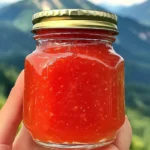
Watermelon Honey
Ingredients
Ingredients
The beauty of this recipe lies in its simplicity:
-
1 large watermelon
That’s literally all you need! No sugar, no preservatives, no complicated additives — just pure watermelon, transformed by your own hands into a luscious honey-like syrup.
Instructions
1. Selecting the Perfect Watermelon
Choosing the right watermelon is crucial. Look for one that feels heavy for its size, with a deep, hollow sound when tapped. The rind should be dull, not shiny, indicating ripeness. The more ripe and sweet the watermelon, the better your honey will taste. If possible, buy a locally grown watermelon during peak season for maximum flavor.
2. Cut and Prepare the Watermelon
Start by washing the exterior of the watermelon thoroughly. Then, carefully cut it into chunks, removing the rind and all the seeds. Seedless watermelons make this step easier, but if you’re working with seeded varieties, be meticulous to remove every seed for a smooth puree.
3. Puree the Watermelon
Transfer the watermelon chunks to a blender or food processor. Blend until you get a smooth, juicy puree. Depending on the size of your blender, you might need to work in batches. The goal is to extract as much juice as possible.
4. Simmer the Puree
Pour the watermelon puree into a large, heavy-bottomed pot. Place it on medium-high heat and bring it to a boil. Once boiling, reduce the heat to low and let it simmer gently. This slow cooking process evaporates excess water and thickens the puree into a syrupy texture.
Important: Stir frequently, especially as the mixture thickens, to prevent sticking or burning. Depending on your stove and pot, this simmering can take anywhere from 1 to 2 hours.
5. Check for Desired Thickness
The watermelon honey is done when it has reduced enough to coat the back of a spoon thickly, similar to the consistency of honey or maple syrup. Remember, it will thicken a little more as it cools.
6. Cool and Store
Remove the pot from heat and allow the watermelon honey to cool completely at room temperature. Once cooled, transfer the syrup into sterilized glass jars or airtight containers. Refrigerate immediately. Stored properly, your watermelon honey can last for up to 3 weeks in the fridge.
